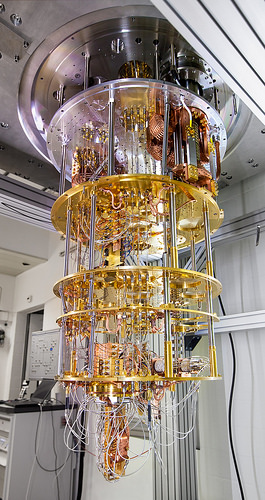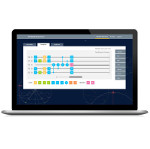| IBM Announces Quantum Computing Prizes |
| Written by Kay Ewbank | |||
| Friday, 05 January 2018 | |||
|
IBM Research has announced new prizes designed to encourage developers, teachers and students to use the IBM QISKit development platform and IBM's cloud quantum environment, the IBM Q Experience. While three of the prizes are for teachers and students, one is directly aimed at developers. IBM Q Experience was launched in 2016. It's a cloud-based quantum computer available for free to anyone with a web browser and an internet connection. IBM says the Q Experience has a community of nearly 60,000 users with 1.7 million quantum experiments and more than 35 third-party research publications.
The QISKit lets developers "conduct explorations" on IBM’s Quantum Experience using a Python interface. The interface lets you work with quantum circuits and execute multiple circuits in batches of experiments. The QISKit project is made up of
The kit includes a number of example Jupyter Notebooks that demonstrate several standard experiments. The prizes on offer include $10,000 for the best university-level course-materials for a lecture series incorporating the IBM Q Experience and QISKit; and $1,000 for the best interactive self-paced tutorial, for either a single or multiple Jupyter Notebooks, that explains a specific focus topic in quantum computing using QISKit and the IBM Q Experience. The third prize on offer is $2,500 and an invite to a quantum event at IBM Research for the highest-impact scientific paper by a master’s degree or PhD student or postdoctoral researcher that uses the IBM Q Experience and QISKit as a tool to achieve the presented results. The prize that is of most interest to developers, however, is the QISKit Developer Challenge. This offers a prize of $5,000 for the best solution to a challenge called: “Optimize to the Max.” The goal is to write a compiler code that takes an input quantum circuit and outputs an optimal circuit for the provided hardware topology. Input circuits are random products of gates from SU(4) that are applied to random pairs of qubits, less than 20 qubits in total. Test circuits are given in the form of a directed acyclic graph and the goal is to map these circuits onto a qubit layout (coupling graph) and reduce the provided cost function as much as possible. Submissions must be written in Python or Cython, and will be accepted starting January 15, ending May 15, 2018. More details are available on the IBM Q Awards website.
More InformationRelated ArticlesIBM Might Give Some Access To Its Five-Qubit Quantum Computer Microsoft Q# Quantum Language And Toolkit Visual Studio Gets Quantum Language Microsoft Open Sources Quantum Computing QScript A Quantum Computer In Your Browser Quantum Mechanics: The Theoretical Minimum Quantum Physics Is Undecidable Microsoft Releases Quantum Computing Tool QScript A Quantum Computer In Your Browser Riecoin Crypto Currency Mines Primes For Riemann Public Key Cryptography Set To Fail In Five Years Solve The Riemann Hypothesis With A Quantum Computer Boson Sampling Tests Quantum Computing A Quantum Computer Finds Factors To be informed about new articles on I Programmer, sign up for our weekly newsletter, subscribe to the RSS feed and follow us on Twitter, Facebook or Linkedin.
Comments
or email your comment to: comments@i-programmer.info |
|||
| Last Updated ( Friday, 05 January 2018 ) |



